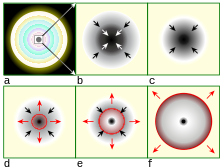Gravitational collapse
Under gravitational collapse is defined as the collapse of a massive star , which is in its final phase is, under its own gravity ; the density and temperature in the star center rise sharply.
procedure
Through the fusion one formed in massive stars iron core that no further energy can release by fusion. This core is surrounded by shells made of silicon and other elements (see shell firing ). Due to the end of the fusion in the center of the star and thus the release of energy, the core can no longer offer resistance to the star's own gravitation through radiation pressure : the interior of the star collapses into a compact object within a few milliseconds . Depending on the mass, the result of the gravitational collapse is a neutron star , a quark star or a black hole (see below).
The gravitational collapse triggers a shock wave that pushes the outer star shell off. As a result, the star explodes as a Type II or Ib / c supernova . The last observed supernova in the vicinity of the Milky Way , the supernova 1987A , occurred in the Large Magellanic Cloud . The light from this supernova reached Earth on February 23, 1987 .
For a detailed description see also Supernova, section Core collapse
Chandrasekhar boundary
If the mass of a star is below the Chandrasekhar limit, there will be no gravitational collapse. Instead, the star evolves into a white dwarf .
Tolman-Oppenheimer-Volkoff border
If the mass of a star is above the Chandrasekhar limit but below the Tolman-Oppenheimer-Volkoff limit (TOV), the gravitational collapse creates a neutron star , possibly also a hypothetical quark star . If the mass of a star is above the TOV, a black hole is created by the gravitational collapse .
literature
- Pankaj S. Joshi: Gravitational collapse and spacetime singularities. Cambridge Univ. Pr., Cambridge 2007, ISBN 978-0-521-87104-4
- BK Harrison, Kip Thorne , Masami Wakano, John Archibald Wheeler : Gravitation theory and gravitational collapse. The Univ. of Chicago Pr., Chicago 1965
Web links
- 5. Final stages of the collapse (PDF; 3.1 MB)
- Gravitational collapse ( Memento from June 23, 2007 in the Internet Archive )
